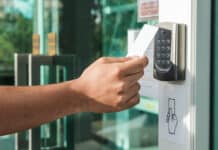Ingersoll Rand Security Technologies, a manufacturer of contactless smart credentials and readers, and The CBORD Group, Inc., a provider of campus card and integrated security solutions to colleges and universities, are currently conducting a comprehensive access control Near Field Communications (NFC) trial at Villanova University.
Since November 2011, students and staff there have been using the aptiQmobile™ Web-based service from Ingersoll Rand Security Technologies along with NFC and their own personal smartphones as their credential to access dormitories, academic buildings, and administration offices. The NFC credential integrates with Villanova’s CS Gold® campus card system from CBORD®.
In the United States, more than 40 million phones are expected to be NFC enabled by the end of 2012, and according to a report by Market Research, nearly half of all mobile phones will be NFC enabled by 2016. The NFC Forum defines the technology as “a standards-based, short-range (a few centimeters) wireless connectivity technology that enables simple and safe two-way interactions between electronic devices, allowing consumers to perform contactless transactions, access digital content, and connect electronic devices with a single touch.”
To enter buildings, Villanova students open the aptiQmobile™ app and tap their phone to the smart reader on the wall in the same way that they would present their Wildcard campus ID badge.
“Today’s students are so technologically advanced that it is second nature for them to put everything on their phones and, most of the time, it’s already in their hands while walking across campus,” explained Kathy Gallagher, Villanova director of card services. “We want to provide our students the utmost in convenience and flexibility through the technology we offer. It’s easier for students to use an app on their phone versus digging for their card.”
During May 2011, three research projects were conducted among 1300 students and decision makers across 980 U.S. colleges and universities. Researchers found that two-thirds of college students are interested in using their mobile phone in place of an ID card. Students feel they are less likely to lose their phone than an ID card, and they know that ID cards are shared; phones aren’t. Using a phone as a credential also offers the ability to erase credential data remotely in case it’s lost or stolen. In a survey among the students in the Villanova trial,more than 70% stated they would prefer to use their phone instead of a badge to enter buildings.
The convenience of using smartphones instead of badges extends to administrators in charge of access control systems. Rather than having to print physical ID badges for each student at enrollment time, a mobile “key” can be issued online directly to the student’s phone, saving the university staff time, administrative costs, and the expense of printers, ink, and card inventory.
“Using smart phones as badges saves time that can be better spent on other issues,” said John Bonass, Villanova systems manager. “Assigning the credential to the students’ phone takes less work than printing and delivering a badge, and since students are very protective of their phones, this should lead to a greatly reduced replacement rate. If a phone is lost or broken, a new ID can be reissued to the new phone without even having the students come to our office.”


















![[VIDEO] Collect Asset Data at the Speed of Walking a Building](https://facilityexecutive.com/wp-content/uploads/2024/02/maxresdefault-324x160.jpg)
Comments are closed.